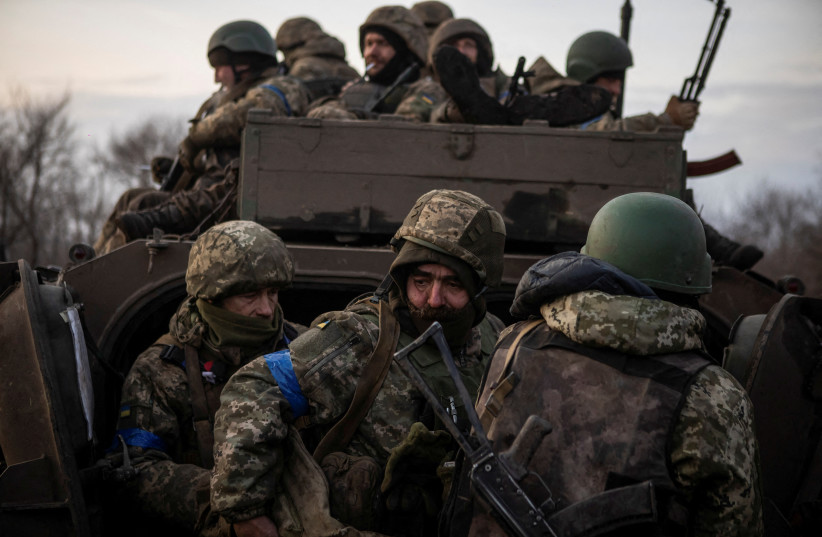Cruelest price of the war is people stopped seeing the faces of Ukrainians in turmoil

The moving faces and powerful stories have been missing from mainstream media, being mostly replaced with the financial costs of the war and updated info on new weaponry and tanks.
It was one year ago when I stood in a synagogue in central Kyiv, surrounded by Jewish leaders and security professionals. As we stood before a big map of the region, they showed me where over 100,000 Russian soldiers were gathering, with the assessment that Russia would try to annex eastern Ukraine in the coming weeks.
“What route would they take if they attacked Kyiv?” I asked innocently. They all laughed. “No one is attacking Kyiv,” they answered confidently. Just a few days later, they were all proven wrong.
Lots have changed since the early days of the war when busloads of Jewish women and children were taken through fields and back-roads in attempts to escape the constant bombardment. I no longer get frantic phone calls from Jewish orphanages in Ukraine, needing to escape their towns in the middle of the night.
Elderly Holocaust survivors are no longer closing their eyes in prayer, resigned to an imminent death due to the war. And we can see by the currently calm border crossings that the urgency for evacuation has dissipated.
But don’t let these things fool you; one year later, the struggles for the over 150,000 Jews still in Ukraine have only grown.
Just a few weeks ago, I had some board members go into Ukraine, to see firsthand the distribution of over $20 million that The Fellowship (International Fellowship of Christians and Jews, of which the writer is president) has donated to help the Jewish community since the war began. They met with our partners, community leaders, and individuals, and what they witnessed was heartbreaking.
They visited assisted living centers for elderly Holocaust survivors with electricity that worked for maybe two hours a day. They met Jewish refugees from eastern Ukraine – emotionally broken people with nothing but the clothes on their backs. They comforted Holocaust survivors who had been literally freezing and starving to death.
As they distributed generators, food boxes, emergency winter heat (and lots of hugs!), the scope of the need was shocking to them. In a once thriving Jewish community in Odesa, almost everyone now needs basic aid just to survive – basic aid that is quickly dwindling as the Jewish community abroad experiences “donor fatigue” from this crisis.
What did people see in the media at the beginning of the war?
AT THE beginning of the war, we banded together to help the Ukrainian people in turmoil. We saw the human toll of this war every time we turned on the television or opened the papers, which were constantly publicizing the dire humanitarian reality and desperate need.
Yet for the past few months, the moving faces and powerful stories have been missing from mainstream media, being mostly replaced with the financial costs of the war and updated info on new weaponry and tanks.
The consequences of this strategic shift of focus have been evident: as the world has stopped seeing the “faces of war,” simply put, they have stopped caring.
For me, this is the hardest and cruelest price of war – to see people like Nathan who are invisible, voiceless, and forgotten, pay the highest price. Nathan is a blind Holocaust survivor in eastern Ukraine. Just five years old when he held his mother in his arms, as she died after being shot by the Nazis, Nathan never moved on. He never got married or settled down. At 90 years old, he still considers himself an orphan.
And until The Fellowship found him and brought him a generator, Nathan was trying to survive the freezing Ukrainian winter with just two hours of electricity each day, his only light or heat coming from a few tea lights next to his bed.
The Fellowship – and our incredible partners at the JDC, Federation of Jewish Communities, and others – exist for people like Nathan. We work around the clock, every day of the year, to find these “forgotten Jews” and provide for them.
The press might have changed its focus. The news might have changed its focus. But in 40 years, The Fellowship’s focus has never changed. During times of peace and war, we continue to carry out our mission of being non-political, saving Jewish lives, and providing comfort, hope, and aid to Jews in need in the former Soviet Union.
As the world marks the one-year anniversary of the war in Ukraine, you will surely read about how much land was or was not conquered, how many weapons Ukraine does or does not have, and the latest Zelensky and Putin speeches. These are all important issues to educate ourselves on. But these are issues on which you and I have little impact.
Yet there is one area that each one of us can impact, where each one of us is needed, and that’s remembering, helping, and being a voice for suffering Jews in Ukraine, forgotten Jews like Nathan.
Today, on the solemn first anniversary of the war – from the privileged, warm, comfort of our homes, let each one of us open our eyes to the suffering of the Ukrainian Jews, and ask ourselves: “Am I my brother’s keeper?”
And I pray that we will answer in unison, “Yes.”
The writer is president of the International Fellowship of Christians and Jews.
Jerusalem Post Store
`; document.getElementById("linkPremium").innerHTML = cont; var divWithLink = document.getElementById("premium-link"); if (divWithLink !== null && divWithLink !== 'undefined') { divWithLink.style.border = "solid 1px #cb0f3e"; divWithLink.style.textAlign = "center"; divWithLink.style.marginBottom = "15px"; divWithLink.style.marginTop = "15px"; divWithLink.style.width = "100%"; divWithLink.style.backgroundColor = "#122952"; divWithLink.style.color = "#ffffff"; divWithLink.style.lineHeight = "1.5"; } } (function (v, i) { });

